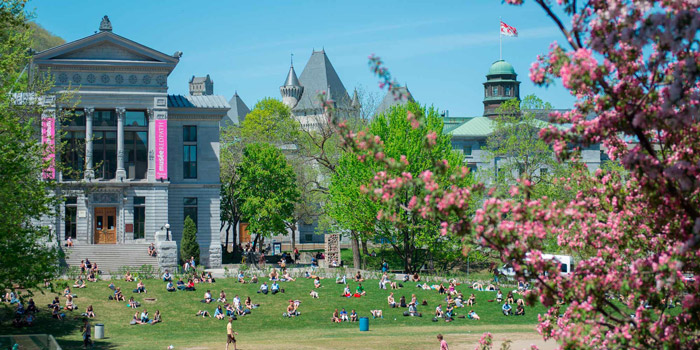The Lower West Field of McGill’s Downtown campus— commonly known as Lower Field among students— has, over the past two years, developed a large area of the field that is barren of grass.
McGill Grounds and Vehicle Maintenance Supervisor Franco Nardi explained the origins of the damage.
“The Lower West Field has been, for many years, the preferred location for the McGill community to hold memorable events and activities including […] Convocation ceremonies,” he said. “These great events have a devastating effect on the lawn due to the massive size of the tent, which covers the area we now see as barren.”
While these practices have been ongoing for quite some time, Nardi explained that the past few years have seen an especially detrimental effect on the field.
“In previous years the damaged area was revived with new grass after the Convocation ceremonies ended,” he said. “It has now been over two years since the last efforts were made.”
According to Nardi, overall funding cuts have contributed to the the lack of maintenance on Lower Field.
“The funding was stopped due to the fact that the practice was no longer sustainable and also coincided with budget cuts announced during that same period,” he said.
In December 2012, due budget cuts within the Quebec government, McGill announced sudden and severe university funding cuts. According to a Senate presentation given by Provost Anthony C. Masi this past April, the university is currently tackling an estimated $1 billion-plus in deferred maintenance needs.
Nardi explained the Grounds department’s future plans to minimize further damage to the field.
“We have been working on more sustainable solutions and scenarios, which include better management of field activities with the implementation of restricted and alternate play areas during the summer months and the use of rainwater recuperation systems,” he said. “We are presently replacing and planting 15 to 20 new trees as a better and sustainable option, and also as an ongoing practice for the time being.”
Senior Campus Planner for the Office of Campus and Space Planning Brian Karasick echoed Nardi’s sentiments.
“The level of outdoor activity within the lower campus, especially for large events, has been steadily increasing,” Karasick said. “As noted, we have experimented with many ground cover options and ground preparations over the years, but none has managed to stand up to the intensity of use and to endure beyond a single season. We clearly need to find a more permanent and sustainable solution, but this will involve some careful consideration of the various activities and their respective impacts [and] needs. This initiative is currently underway.”
Karasick explained that all plans for the initiative are still in a preliminary stage and have yet to be solidified.
“This involves a number of McGill departments, and we’re still in the data gathering stage, so it’s too early to speculate on potential solutions,” he said. “Safety, cost-effectiveness, and sustainability will certainly be key determinants.”
Ben Ger, U2 Environment, agreed that the practice of maintaining Lower Field is not sustainable.
“To some extent, front lawns in general are not completely sustainable,” he said. “Though there [are both] costs and benefits to it, at the end of the day, plain grass lawns, especially massive ones like McGill’s, do waste water.”
Ger suggested other potential uses for Lower Field that might make the land more sustainable and effective.
“Alternative uses for those spaces [include] interactive green spaces on Lower Field— specifically greenhouses to study in like Concordia’s— or expanding Campus Crops […] potentially onto Lower Field,” he said. “[Providing] places for community building [has] shown to have significant positive effects on productivity, and can be beneficial to mental health for many people.”
Ger, however, did acknowledge the complicated intricacies that come with making changes to McGill’s green spaces.
“Green spaces are complex issues that encompass mental health, spaces on campus, environmental cost and benefits, and fiscal feasibility. So I hope somebody who in a position of power on campus is paying attention.”







